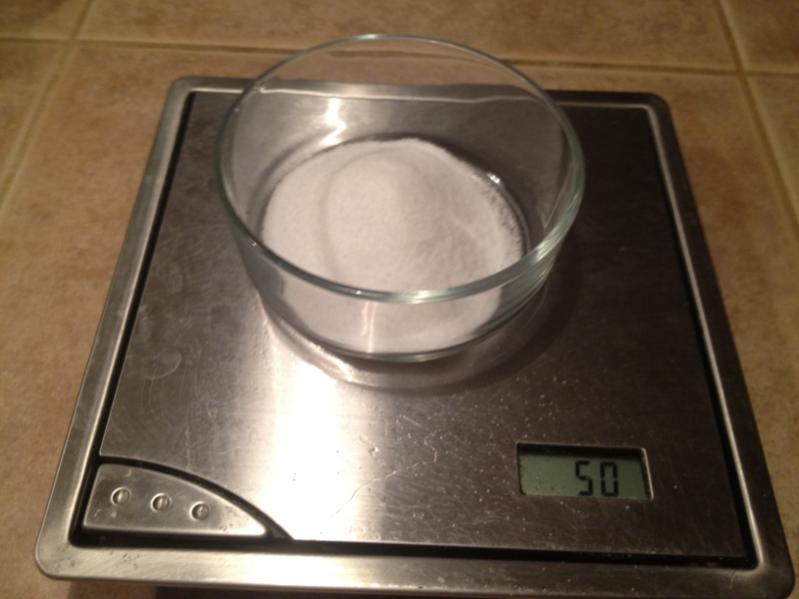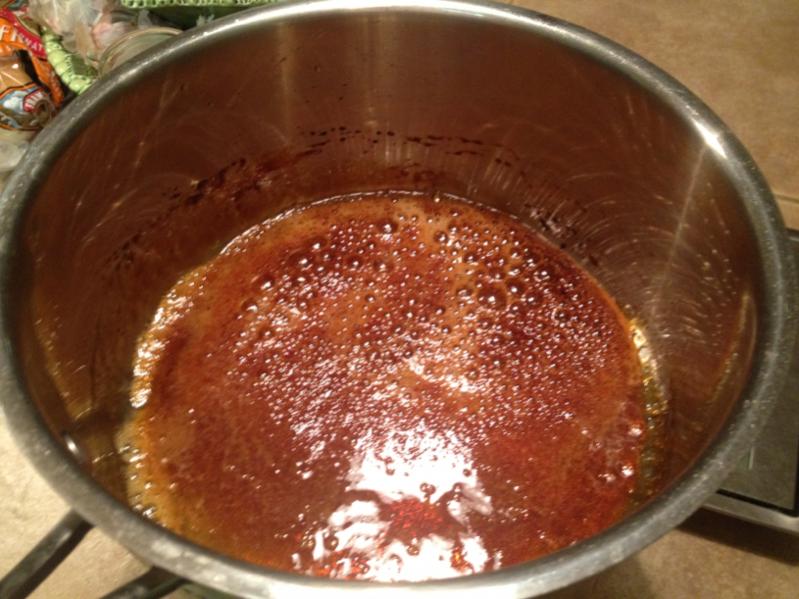bottlebomber
Well-Known Member
Awesome. Getting together enough of an order for free shipping will be no problem. Where did you find that promo code? I wonder how long it's good for..

bottlebomber said:Awesome. Getting together enough of an order for free shipping will be no problem. Where did you find that promo code? I wonder how long it's good for..
So I got my stuff today, and I did it. I feel like it was a big success, and it basically accomplished just what I was after. I decided to sack up and use a dry caramel method. I don't know if that was the best idea, as this stuff behaves MUCH differently than table sugar when it is caramelizing. I had crystallization from hell because I was paranoid about burning it, and stirred about 10x more than I would have if I was making regular caramel. In the end I took it right to where I wanted it, just shy of burnt. One thing that I found very strange was that when sucrose is caramelized, it gets perceivably less sweet as it caramelizes. But with this lactose, it seemed the opposite. It tasted bland and chalky while dry, but rich and sweet when caramelized.
I am very happy with the experiment so far, now I just need to see if the flavor will hold up in the beer. When I was done I put about a pint of water back in, dissolved the caramel, chucked 3 Tahitian vanilla beans in and then put it into secondary and racked my brûlée stout onto it.
Just got 8 lbs of lactose for $2.82 a pound delivered, half the price of most places and with free shipping at that. Nice deal.emjay said:1) Go to the following link: http://www.iherb.com/Now-Foods-Healthy-Foods-Lactose-Milk-Sugar-1-lb-454-g/657
3) Use the coupon code BUY123 (gives $5 off your first order; $10 if you spend over $40)
The thing if it is that the caramel made with table sugar is still going to be 100% fermentable - and thats what I was trying to get away from. Also by introducing actually dairy you have all of the volatile fats and oil along with whatever other solids are in the milk. I'd love to get actual cream into this if I thought I could get away with it. I don't think I could though, after reading the cheese beer thread.
keesh said:Well it was worth a try. I thought choosing skim milk would avoid putting any fat into the beer.
ColumbusAmongus said:Did you brew it yet? I want to pop out a high abv sweet stout of some sort this weekend but I might follow your idea with the lactose because it sounds pretty interesting. Pics look good and your description of the lactose gaining sweetness post caramelization is getting me excited!
tedclev said:Bottlebomber, love this idea! What exactly was your process for caramelizing the lactose? Did you mix it with water and then heat? High heat, medium heat? etc... Thanks!
bottlebomber said:The thing if it is that the caramel made with table sugar is still going to be 100% fermentable
emjay said:I'm still like 98% certain that this is actually untrue.
bottlebomber said:I haven't tried that part of it yet! Tomorrow - making 100 ml of caramelized sugar syrup and adding a half packet of champ yeast. If it hits 1.00 I am right. What would it have to hit for you to be right? It must be at least mostly fermentable, right?
Also, I wonder if carbonized sugar would even contribute to brix?
helibrewer said:Carmelization is a hydrolysis reaction. For Table sugar (surcrose) it breaksdown into glucose and fructose. For Lactose (another dissacharide) it breaksdown into glucose and galactose.
Yeast will not ferment galactose in the presence of glucose and I have seen some literature that suggests that with glucose present the yeasts gene for fermenting galactose never gets turned on so even once all the glucose is consumed, the galactose will not be fermented providing residual sweetness.
helibrewer said:Carmelization is a hydrolysis reaction. For Table sugar (surcrose) it breaksdown into glucose and fructose. For Lactose (another dissacharide) it breaksdown into glucose and galactose.
Yeast will not ferment galactose in the presence of glucose and I have seen some literature that suggests that with glucose present the yeasts gene for fermenting galactose never gets turned on so even once all the glucose is consumed, the galactose will not be fermented providing residual sweetness.
ColumbusAmongus said:Ah...not even close. Hydrolysis is specifically the addition of water to cleave a bond. Polysaccharides do hydrolyze in presence of heat and water but much more happens after that in caramelization. You end up with all sorts of crazy high molecular weight species, not just a pot of monosaccharides.
emjay said:I'm still like 98% certain that this is actually untrue.
emjay said:This. It should be rather obvious with even just a momentary glance that caramelized table sugar is more than simply glucose and fructose. It results in all kinds of different higher-order sugars, which should not be fermentable, especially since we actually know exactly which sugars these yeast species can ferment.
bottlebomber said:Emjay, let me know if you can find any flaws in this - I'm going to weigh out around 50 grams of table sugar x2. One is going to be caramelized. The other is simply going to be dissolved. Both will be equal in volume (after redissolving in the case of the caramelized sugar). Now there's two things in curious about. If both are weighed accurately, and both have the same volume at 70 degrees, will the hydrometer read the same on both. And more importantly, how will they ferment comparatively. I will split a packet of yeast by volume between the two.
My theory is that they will be equally fermentable. However I have a funny thought that they may read differently on the SG. You suggested, if I'm not wrong, that the caramelized sugar would be highly unfermentable. I think you may be wrong, because a Bochet is probably similar in composition and it is fermentable.
ColumbusAmongus said:I think you still have a lot of fermentable sugar left in a caramel so you might not see too huge of a difference.
Exactly. Monosaccharides aren't brown either.
bottlebomber said:Thats kind of what I was thinking. There may be a difference, but not a large one. However, I was thinking that some of the caramelized solution may not even be fully soluble, and will not contribute to the reading. We shall see.
bottlebomber said:If both are weighed accurately, and both have the same volume at 70 degrees, will the hydrometer read the same on both.
Here's the thing... even I will admit that caramel isn't necessarily "highly unfermentable", for two reasons. The first is that the term itself is subjective... at what point does it go from somewhat unfermentable to "highly" so?bottlebomber said:You suggested, if I'm not wrong, that the caramelized sugar would be highly unfermentable. I think you may be wrong, because a Bochet is probably similar in composition and it is fermentable.
emjay said:Not necessarily, even if it remains all in solution, as the density of the molecules produced can differ. If they're different, you might even try having a third solution, using caramel to the same SG as the table sugar solution. I suspect the difference might be smaller than you're capable of reliably measuring, though.
Here's the thing... even I will admit that caramel isn't necessarily "highly unfermentable", for two reasons. The first is that the term itself is subjective... at what point does it go from somewhat unfermentable to "highly" so?
But more importantly, and on a somewhat related note, caramelization is a process that can be done to different degrees, it's not like there's a sharp division between uncaramelized and caramelized sugar. So what I'm saying is that fermentability will be affected by the degree to which you caramelize the sugars. If you only lightly caramelize them, it will be more fermentable than a well-caramelized solution. And in practice, I'd say it's always going to be fermentable, if only partially so.
We know that all these higher order sugars and other crazy molecules are created during the caramelization process, and we know that the yeast we use only has the enzymes to ferment a handful of simpler sugars. I'm not sure where in the science you think there's room for the possibility that it will remain 100% fermentable, because it should be clear that there isn't.
That's not to say that caramelizing lactose is pointless, as it will certainly produce a different product, but the assumption that led you to think it necessary is indeed incorrect.
Feel free to do the experiment anyways, as there's little harm in doing it. Unless you conduct it poorly, that is, so just make sure the sugar is VERY well-caramelized so that it isn't merely slightly unfermentable with the difference in FG falling within the margin of error. Use a specialized FG hydrometer if you can to reduce this margin of error. But really, if the initially brown solution doesn't turn clear, there isn't even really any need to take the measurement, is there?
Anyways, I don't mean to sound like a pompous ******* or dismissive of your idea "just because", and I hope you understand that. But the science behind all this is well understood and there's really no scientific basis whatsoever for your hypothesis.
Huh? I didn't say that. In fact, I said the opposite. :/bottlebomber said:The second matter being your assertion that caramelized lactose may not be useful as a brewing practice.
emjay said:That's not to say that caramelizing lactose is pointless, as it will certainly produce a different product
My apologies for the misunderstanding. See, I've been spending too much time with you in the debate forum. If I had been spending more time in the Tap Room, I could just call you a ***** and be done with itemjay said:Huh? I didn't say that. In fact, I said the opposite. :/
Aaah, gotcha. It's been a long week. Well, the good news is that said fermentation is underway. I deeply caramelized 50 grams of sugar until it was smoking. Even with my primitive equipment, both samples came out to exactly 1.028 on my refractometer, and 1.030 on the hydro. I wish I would have made it higher gravity to get a broader spectrum, and it might not be adequate. If no obvious difference is measurable, I may try it again with 150 grams.The thing I have been disagreeing with was your initial assertion (and then later reassertion) that caramelizing sucrose for beer was an exercise in futility as it would just be completely fermented anyways, which simply isn't true.



emjay said:You should do a third and fourth solution with caramelized and straight lactose, at the same gravity. The galactose could indeed make the former partially fermentable.
bottlebomber said:I think I will! That was definitely an interesting idea. Even though Heli never really followed up with any source material he seemed to know what he was talking about, and that's grounds for an experiment. I know from what I did that the flavor was very different. I've never heard of galactose.
Enter your email address to join: